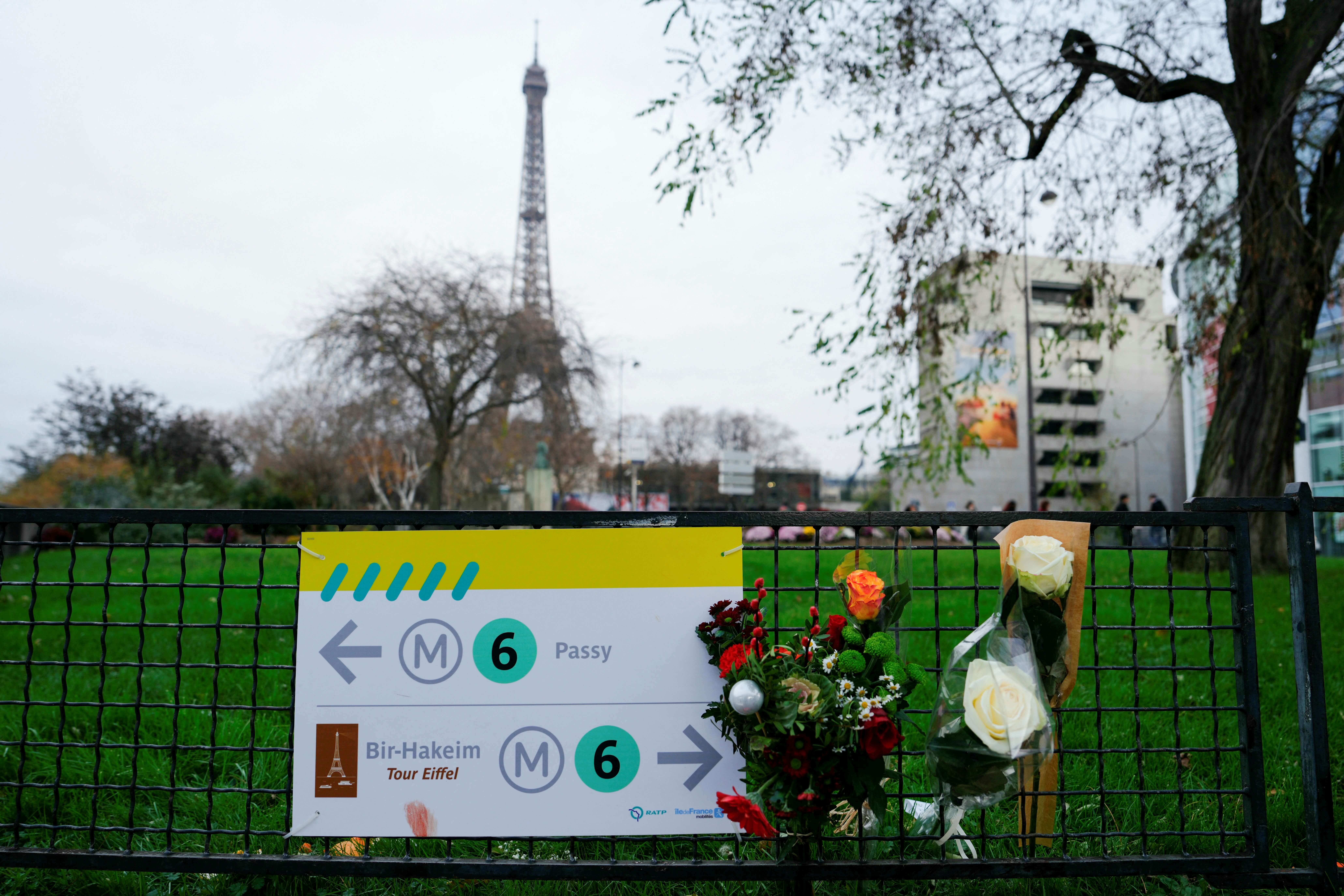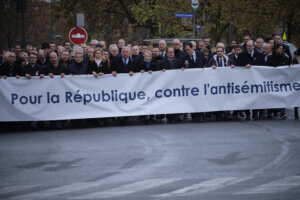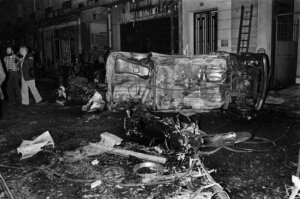Is an intifada in France inevitable? Peut-être
This year, there have already been three times as many antisemitic acts in France as there were in 2022

Flowers are displayed near where a tourist was stabbed to death near the Eiffel Tower on Dec. 2, 2023. Photo by Getty Images
One evening last week, my wife and I walked along the quai de Grenelle, the avenue that runs along Paris’ left bank. Though the weather was frigid and sky was overcast, the sidewalk was thick with Parisians on their way to their homes and tourists on their way to the Eiffel Tower, effervescent with holiday lights that exploded in glittering glory every few minutes. As for the avenue itself, it is largely non-descript, best known for lending its name to a very noir 1950 French film that involves mistaken identities and, of course, murders most foul.
Yet just a few evenings earlier, on December 2, life imitated art on the quai des Grenelle. A young man, wielding a hammer and knife and shouting “Allah akbar!” (God is great), murdered a German tourist and wounded two others before he was tasered and taken away by the police. The suspect, a French citizen of Iranian origin named Armand Rajabpour-Miyandoab, had long been on the radar of French counter-terrorist officials. In fact, he underwent a rigorous process of “deradicalization” and persuaded his case workers, including psychiatrists, that he now rejected the goals of jihadist.
His success in pulling the wool over the eyes of trained professionals is disturbing. Equally disturbing was the news that Rajabpour-Miyandoab had initially planned to attack visitors to the Enfants du Vel d’Hiv, the memorial garden stretching along the quai de Grenelle that commemorates the round-up and deportation of more than 4,000 Jewish children by French police in 1942. It was only when he discovered the park was empty that Rajabpour-Miyandoab, unable to determine who was and wasn’t Jewish—unlike 1942, Jews are no longer required to wear a yellow star on their coats—decided that any innocent life might as well be taken. As he declared in the video he released shortly before his rampage, “I stun with a hammer then kill with a knife.”

According to the most recent tally by government officials, more than 1,500 antisemitic acts have been reported in France since the Hamas massacre of more than 1,200 Israeli men, women, and children on Oct. 7. While most of these acts are limited to verbal violence, other have spilled into physical violence. More than three weeks remain before the end of 2023, but the number of such incidents already trebles the total number of antisemitic acts such incidents in all of 2022.
While shocking, the statistics are not surprising. There have been similar leaps in antisemitic activity on the European and American continents. (According to the Anti-Defamation League, slightly more than 2,000 antisemitic incidents occurred in the United States between Oct. 7 and Dec. 7.) Whenever there are especially violent explosions in either Israel or the occupied territories, societies across the western world are often rocked by the subsequent shock waves.
Yet France remains a case apart, a tragic terre d’élection or chosen land where the simmering animosities and stubborn aspirations of Israelis and Palestinians are echoed in exceptional ways. Tellingly, both French and foreign historians have long described France as a country of exceptions, one whose social and political practices often run counter to those of other western democracies. Vive la différence is not just a cultural imperative for the French, but it is also indicative of their country’s status as a nation pas comme les autres.
This quality is, well, exceptionally pronounced when it comes to events at the other end of the Mediterranean. France boasts the world’s third largest Jewish population, after Israel and the United States — estimated to be half a million — as well as the largest Muslim population in Europe, which is thought to number at least five million. (Both numbers are approximations since French law forbids census takers to ask respondents for their religious and ethnic backgrounds. Yet certain scholars like Jérôme Fourquet believe the size of the Muslim community is substantially higher.)
Moreover, both communities bear the burden of a complicated past with their country. In the case of French Jewry, the Revolution turned them into citizens long before any other European Jewish community could make such a claim. Yet, at the same time, France has not only been the hothouse for modern antisemitism but also the stage for Vichy, the collaborationist government that packed off more than 70,000 French and foreign Jews to the death camps in the east.
As for French Muslims, the past has been no less vexed and at times violent. A substantial number, who can trace the origin of their families to the former colonies in North and Central Africa, have managed to integrate and succeed as citizens in the country of their former colonizer. For them, the republican and revolutionary ideals of liberty, equality, and perhaps even fraternity seem to hold. But for many, many others, especially those trapped in the derelict and desperate suburbs that ring Paris and other cities, these ideals mean little.
Not surprisingly, these suburban and urban youths, especially those who are associated with political movements like Les Indigènes de la République (The Indigenous Peoples of the Republic) identify their lot with the Palestinians in Gaza and West Bank. This act of identification in turn transformed the French Jewish community into one of their principal nemeses. (An identification aided by the mostly uncritical support expressed by French Jewish organizations like Crif for Israeli policies.) With the eruption of the Second Intifada in 2000, the social tensions that had long been simmering in France exploded as well with the torching of suburbs and targeting of French Jews.
As commentators remarked at the time, the Israeli and Palestinian conflict had effectively been imported to French soil. It was a conflict that had become, as an astute observer of international relations noted a decade ago, “a French affair and a national security issue. The centrality of the Israeli-Palestinian conflict is largely accepted in the French political arena as a fact.”

I had the good fortune to interview that observer, Marc Hecker, during my stay in Paris. We met in his office at the French Institute of International Relations, a think tank on the Left Bank where Hecker serves as director of research and communications. The author of several books, including the widely praised Intifada française? and, with Elie Tenenbaum, La Guerre de vingt ans: Dijhadisme et contre-terrorisme au XXIe siècle, Hecker has been much in demand of late. When I remarked that events since Oct. 7 must be keeping IFRI busy, however, Hecker smiled wanly. “This is business we can do without,” he said.
Fluent in English, Hecker opted to speak in French. “It is always difficult, even in my mother tongue,” he remarked, “to find the exact words for so sensitive a subject.” Hecker had cited a statement made at the start of the war by an IDF spokesperson: “The doors to hell have been opened.” He nodded: “We are effectively facing hell right now.” The doors were flung open by what he called the “shock of collective memory.” Galvanized by the cascading and catastrophic events in Israel and Gaza, both Israelis and Palestinians framed their experiences in terms of past disasters — namely the memory of the Shoah and the Nakba.
When I asked whether Hamas, as some commentators suggest, is a terrorist group whose character and goals set it apart from other terrorist organizations like The Islamic State, Hecker agreed but only to a point. He noted that while Daesh (the term he used for IS) was also a political and social organization like Hamas, it never took part, as did Hamas, in electoral politics.Yet, he added, something changed on October 7. The gruesome nature of the attack — marked by rapes, executions, and mutilations, much of which was recorded on video — smacked of tactics used by Daesh. So much so, Hecker suggested, that Hamas may be undergoing a process of “Daechization.”
Whether that is true remains to be seen. But we are already seeing some of the consequences in France of both the massacre and Israeli military response. The long history to this dynamic, Hecker noted, can be organized according to several different, but often overlapping “spheres.” The most recent and relevant spheres involve the extreme left in French politics and desperation in the suburbs. The deepening divisions on the left between the traditional parties — the Socialists, Communists, and Ecologists — which have denounced the massacre and Defiant France, the extreme leftwing party whose leader, the outspoken Jean-Luc Mélenchon refuses to label Hamas as a terrorist organization, are clear enough.
What is less clear, though, is the state of mind of the disaffected youths living in the impoverished neighborhoods in the Paris region and other cities. the nation’s peripheral neighborhoods. of North African origin—a lack of clarity largely due, ironically, to the government’s current policies. Intent on avoiding yet another round of riots that might engulf Jewish institutions, the Interior Minister, Gérald Darmanin, initially issued a blanket prohibition on pro-Palestinian demonstrations. When a French court ruled the policy unconstitutional, Darmanin shifted to a case-by-case approach. As Hecker noted, the consequences have been both positive and problematic. On the one hand, none of the demonstrations have veered toward violence as they did in years past; on the other hand, the government’s policy has, in Hecker’s words, “shattered the thermometer” that would allow the government (and observers) to take an accurate pulse of those who actively support terrorist groups like Hamas.
As our conversation drew to a close, I asked Hecker for his thoughts about the possibility of an intifada occurring in France. After a long pause, he looked back to the riots that swept France this past summer. Hecker recalled that there were some pro-Palestinian groups who then believed that a French intifada had, in fact, started. “They published a communiqué that compared the situation in the French suburbs to the occupation of the Palestinian territories. With hindsight, one can doubt that the rioters had such geopolitical awareness. That being said, the current war in the Gaza Strip has a strong echo and contributes to further polarization among the French. Whether it could lead to an eruption of violence in France remains to be seen.”
















